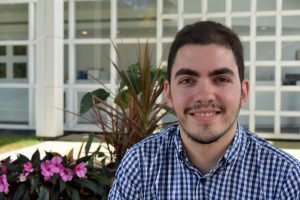Our 2017-18 class of International Peacemaking Program fellows includes nine students, four from the U.S. and five from other countries. We asked each one of them the same set of questions.
Q. Briefly tell us about your educational background
A. My B.A. is in Orthodox Theology. I studied in the University of Athens and I am currently pursuing a Master’s Degree in Religious Education.
Q. How did you learn about Hartford Seminary’s International Peacemaking Program?
A. I learned about the IPP by my academic advisor, who had met [President] Heidi Hadsell in a conference back in Greece. I then applied for the scholarship and got accepted at the Seminary.
Q. Why are you interested in learning about peacemaking?
A. I am interested in learning about peacemaking, because I find it to be a unique way to overcome the divisions our societies face. Moreover, I believe that peacemaking is combined perfectly with religion and interreligious studies.
Q. How do you hope to use your skills after a year of training as a peacemaker?
A. I hope that, after I complete my studies at Hartford, I would be able to go back to Greece and help with the situation my country is facing. Given that I have previous experience in educational programs, I plan to train teachers and students into forming interreligious communities in schools.
Q. Tell us a little about your home country and the interreligious conflict it faces.
A. The interreligious conflict Greece faces has its roots in the recent refugee crisis. On the one side there are the refugees – the majority of whom are Muslims – and on the other side there are the conservative parts of Greek society, who draw their arguments from the right-wing ideology and its parties.
Q. Give us a quick description of your home life (family, where you live, etc.)
A. I was born and raised in an interreligious environment. My father is a Syrian Muslim and my mother is a Greek Orthodox Christian. I was baptized as an Orthodox Christian two years ago. I currently live in Athens with my mother.
Q. Hartford Seminary is using the phrase “We Were Built for This Time” to address the deep divisions in our country and across the world. What does that mean to you?
A. In my opinion, this phrase applies globally, as we observe divisions in every corner of the planet. Our duty is to live and learn by the peacemaking process in order to make the world a better place.

 Sign-up now ›
Sign-up now ›